Do you know if ferrets cause allergies?
Is a ferret hypoallergenic pet or not?
Today I want to share with you information about ferrets and how and why can they cause allergies. What is means for a ferret to be hypoallergenic? What should you do to make sure you don’t have any allergic reactions to ferrets? What can you do to lower the ferret allergy symptoms? Read that and much other useful information in this post!
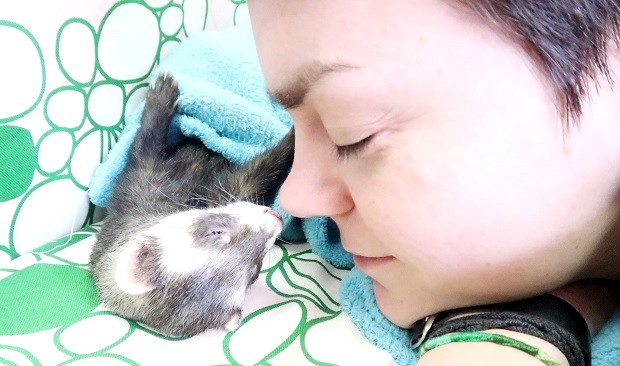
TABLE OF CONTENTS
Are Ferrets Hypoallergenic?
Before I answer this question, we have to establish what it means the term “hypoallergenic”. Hypoallergenic doesn’t mean you won’t get any allergic reaction, it means that the item or animal has a low risk of provoking an allergic reaction in a person. So, if something is hypoallergenic it can still trigger an allergic reaction although the chances are smaller than with regular items and animals.

So, back to the question. Are ferrets hypoallergenic? Yes, you can consider ferrets hypoallergenic animals. They can cause an allergic reaction, but the chance for that is small. Also, most ferret allergy symptoms are low to mild. But, you can’t know if you are allergic to ferret until you spend some time with one.
What Causes Allergic Reaction To Ferrets?
There isn’t one cause of all allergic reactions people have regarding animals. There are many allergens, but today, we will focus on those we can connect to ferrets. Those allergens you can find in the ferret’s body, urine, and saliva.
Dander On Hair
The most common allergen in the animal world is connected to animals with fur. That is why people are often allergic to cats, dogs, and other furry animals. Also, that is why there are almost no allergic reactions to snakes and reptiles. But, the allergen in that situation isn’t connected to fur, it is connected to dander. Dander is a small particle that stays on the strand of hair or fur. Once the animal sheds, the dander comes off its body connected to that strand of hair and stays on your clothes, on the floor, on the bedding, etc.
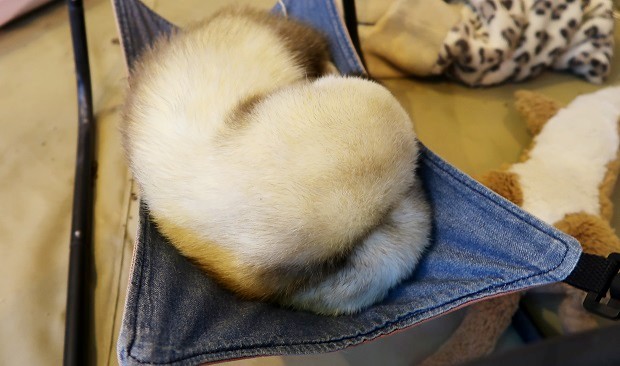
Since ferrets don’t shed that much (twice a year seasonal shed, the rest of the year minimal) they usually don’t cause allergic reactions to their owners and people around them. If that happens, it is usually during those two shedding seasons, which means it will last only a couple of weeks. But, there are a few things you can do to maintain the ferret’s fur and avoid excessive shedding. I will share those tips with you later in the article.
Ferret’s Saliva & Urine
Another pretty common allergen found in pets is their saliva and urine. So, if you are allergic to saliva, you know that dogs aren’t a good option for you since they love to lick their owners, friends, furniture, everything. Also, drooling dog breeds are the worst possible option for people who are allergic to saliva since their saliva is almost everywhere. The same thing is with urine. Cats can urinate on furniture for many different reasons so they aren’t a good choice for people allergic to urine. One of the proteins that cause allergic reactions to urine and saliva is called Albumin.

When it comes to saliva, you should know that ferrets lick themselves. They don’t like to lick people or pieces of furniture and they don’t produce that much saliva so the chances of getting an allergic reaction from a ferret’s saliva are slim. It can happen, but it is not that often. Urine, on the other hand, is not something you can easily control. If you are allergic to ferret urine, the best thing you can do is to avoid cleaning litter boxes filled with urine and feces.
What Are Ferret Allergy Symptoms?
If you are allergic to ferrets you will experience a set of symptoms that are common for allergies. The good thing is that most symptoms are mild ones which means they will cause irritation, but they won’t turn into serious health issues.
Respiratory Symptoms
Most symptoms are connected to your respiratory system, meaning you will develop a runny nose or sore throat. Also, you can experience sneezing and coughing. Symptoms like asthma attacks and breathing difficulty are the most severe symptoms.

Skin Issues
Besides respiratory problems, a person allergic to ferrets can experience skin rashes, skin irritation, and acne or eczema. Those problems aren’t that severe, but they can affect a person’s lifestyle so they should be under control.
How Can You Tell You Are Allergic To Ferrets?
All symptoms mentioned above are common for different types of allergies so you have to be 100% sure that you are allergic to ferrets and not something else in your home. So, how can you tell whether you are allergic to ferrets?
Hold A Ferret
It doesn’t matter whether you are an experienced ferret owner, or you haven’t had one in your arms before, you have to be near the ferret. If you don’t have one at home, visit your friend with a ferret and play with him, hold him, spend some time with the ferret. If you don’t have a friend with a ferret, visit a rescue or a shelter with ferrets. Explain to the people there why you came and they will help you. Who knows, you might even find your future pet there.
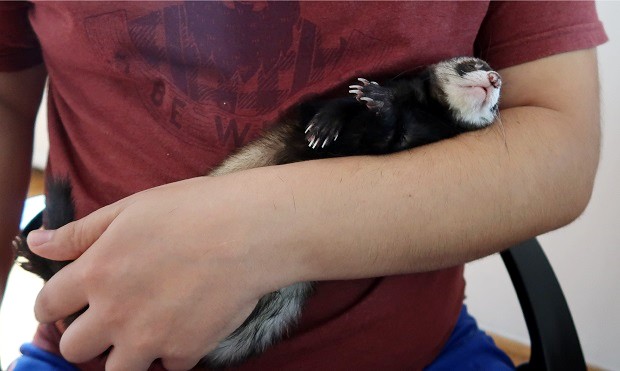
I wouldn’t recommend visiting ferrets in pet stores since they can bite you if you don’t handle them properly. Ferrets in pet stores are often neglected and aren’t used to human hands. During and after playtime observe your body and look for allergic reactions.
Rule Out Other Allergens
Before you claim that your ferret is the main allergen, consider other causes like dust in your home. Ferrets are walking close to the floor and love to crawl around tight spaces which means their coat is filled with dust. Dust can stick on their coat and that can cause allergic reactions too. The same story is with oil on their body can cause acne.
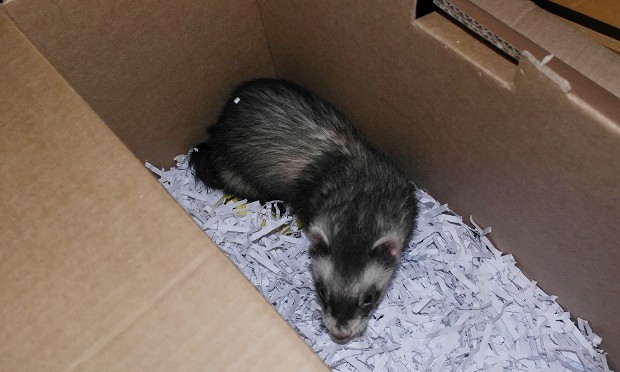
So, if you want to be completely sure you aren’t allergic to dust or some other particle, wipe your ferret with a wet wipe before you two cuddle so you can remove excess dust from their coat. Also, wash your hands after cleaning the litter box and after handling your ferret.
How To Live With Ferret Allergies?
If you know that you have an allergic reaction to ferrets but you don’t want to give ferrets away, there are a few things you can do to keep your symptoms under control.
Talk To Your Doctor
The first thing you need to do is talk to your doctor and see if there are some medicines that can lower the symptoms. Also, make sure you pick the right medicine that won’t harm your health and that will actually help you with the allergic reaction so don’t do it on your own.
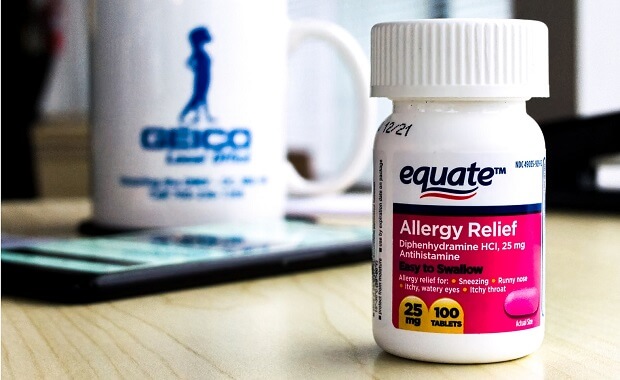
Keep Your Home Clean
It doesn’t matter whether you are allergic to ferret’s saliva, urine, or dander, if you keep your home clean, you will experience mild symptoms. You can vacuum and clean the floors in your home. Also, don’t forget to dust the furniture inside and out, even the walls up to your thigh. You can do that once a week, more often in spring and autumn when the shedding seasons happen.
Activate HEPA Filters
HEPA filters are known as a great help for people with allergies since they remove dander, pollen, dust, and any other harmful particle in the air. Also, HEPA filters can’t harm you or your ferret so they are perfectly safe for every member of your family. Remember, don’t use perfumed air fresheners, they can irritate ferrets and you too.
Clean Ferret Cage
The ferret cage is probably the biggest allergen in your home and it should be cleaned once a week. It is a smart move to ask one of the family members to clean the litter box, the cage, or change the bedding so you don’t have to come in close contact with them. Make sure they clean the litter box once a day so you can minimize the amount of urine and feces in your home.
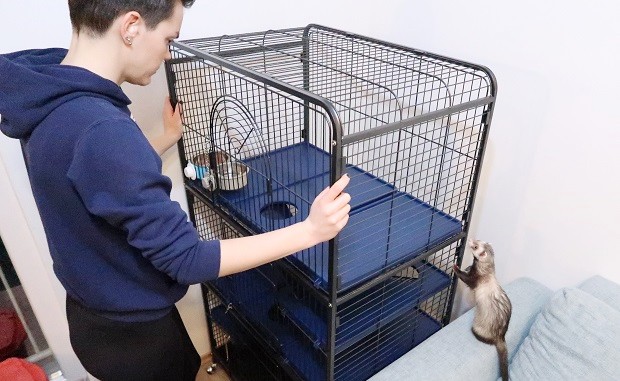
Keep Your Ferrets Clean
That doesn’t mean you should bathe your ferret often. Actually, if you do it too much, you can irritate his skin that will cause itching, scratching, and more dander for you to choke on. Don’t bathe your ferret unless it is really dirty, but you can wipe your ferret with a damp cloth to remove dust and other particles before you decide to snuggle.
Keep Your Ferrets Healthy
Keeping your ferret in the best health will reduce shedding and strengthen the ferret coat. Make sure you feed your ferret with the best ferret food, give him enough playtime, and go to the vet for an annual checkup so you can be sure the ferret is healthy.
Wash Your Hands
When you are done with playing or cuddling with your ferret, wash your hands. That way you can be sure you removed all dander, saliva, and urine particles from your hands and you won’t spread it around your home or on your face. Actually, that is something you should do matter do you have ferret allergies or not.

Own 1-2 Ferrets Max
Having an entire business of ferrets is awesome and there is not a single dull moment with them. But, although ferrets are hypoallergenic, having more ferrets can worsen your symptoms. If you are allergic to ferrets, keep their number to a minimum, just for your sake. Owning one or two ferrets is more than enough if you have an allergic reaction to ferrets. Everything above that can cause you serious problems.
FAQ
If You Are Allergic To Cats Are You Allergic To Ferrets?
There isn’t a rule on allergies so it is hard to say yes or no to this question. But, if you are allergic to Albumin then you are most likely allergic to both cats and ferrets. That is a protein commonly found in both animals. But, again, it is a possibility, not a rule.
Can Ferrets Trigger Asthma?
Yes, ferrets can trigger asthma just as other animals like birds, rodents, cats, dogs, etc.
Are Ferrets Bad For Allergies?
If a person is allergic to ferrets then they are bad for allergies. But, ferrets are considered hypoallergenic animals, which means they are less likely to trigger an allergy than cats or dogs. Also, the ferret allergic reaction is mostly mild.
Conclusion
We can tell that ferrets are hypoallergenic because they will cause mild allergic symptoms (if there are any symptoms at all). But, no one can tell you with 100% certainty you will have an allergic reaction or not. The best way to find out is to hold a ferret and spend some time with one. Do you know a person allergic to any pet? Share with us tips for fighting allergies!












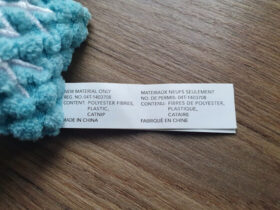






Leave a Reply